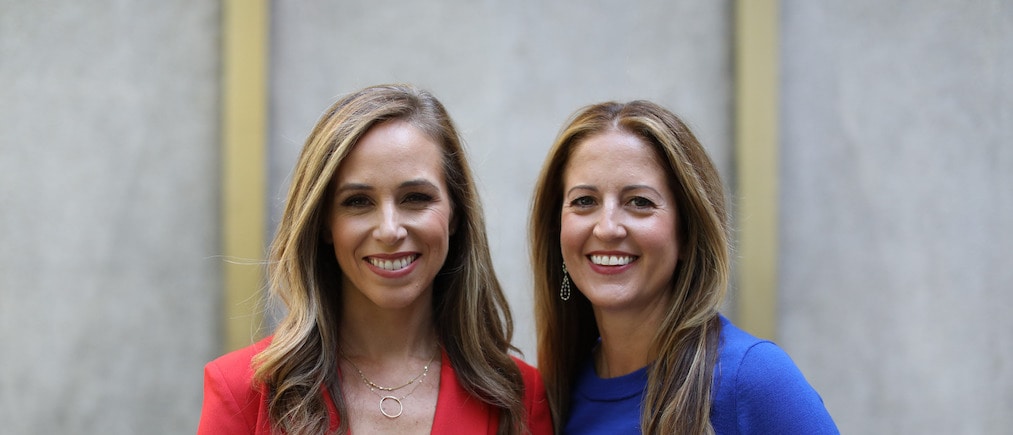A solid foundation is fundamental – whether you’re building the perfect outfit or a successful clothing company.
Galyn Bernard and Christina Carbonell, co-founders of kids’ clothing brand Primary, have prioritized balance, authenticity, and honesty in their workplace since they started the business which they discussed in a recent Office Hours episode.
The two were already familiar with each other’s work styles and best skills after working at another company together. Their friendship formed a strong base for how the brand would operate: by caring about people first.
“We fundamentally believe that you can build a great business and do big things, and prioritize the wellbeing of the team,” Carbonell said. “Those two things do not have to be at odds.”
To do that, flexibility and creativity are key. Luckily, the duo brought those traits to the table themselves, which helped form the initial building blocks of the business. For example, without an office, they worked on business plans from a sports club café in New York City. Even now, you might find the two brewing up big ideas on a restaurant placemat, Bernard said.
By being honest with each other, they found the support and guidance to take the big leap forward. When expanding the team, Bernard and Carbonell aimed to provide a flexible, authentic work environment where people are motivated to do great work – but also take care of themselves.
Here’s how they found the right rhythm.
1. Try on a Four-Day Workweek
The idea of a four-day workweek was already buzzing in the brains of Bernard and Carbonell before the pandemic. But with the endless video calls in the early days of the pandemic, the two decided to finally have the team try it on.
Hoping to prevent employee burnout, they started a test run of a four-day week, with every Friday off for employees. To keep serving customers every day, customer care employees had Fridays off on a rotating schedule.
On Fridays, there were no meetings, and employees could do what they wanted with their time. For some, that might mean catching up on work tasks, but it’s totally up to them. Carbonell noted that many business owners fear a four-day work week because less time seems like less productivity.
“We weren’t sure how it would go, and we haven’t gone back,” Carbonell said. “We have found that productivity is stronger because people have flexibility, choice, and an ability to balance their personal obligations in a way that when working they are focused, efficient, and super productive and bringing everything they’ve got.”
2. Layer on Authenticity
Being authentic is key to both the brand itself and Primary’s work environment. For example, Carbonell noted the importance of laughter at work, which she said can help break up intense moments.
For Bernard, too, being authentic means showing your emotions, whether they’re good or bad. Sometimes people just need to express themselves, she said.
“The team has definitely seen me cry in happy and sad moments, and it’s just part of who I am,” she said. “It helps to foster trust among the whole team when we know that everyone’s showing up in a really honest way.”
3. Embrace Honesty
When it comes to learning and growing together, honesty is crucial. Bernard and Carbonell built the business by being transparent with each other, and they still use that as a primary building block of the brand, both for its products and its work culture.
The co-founders aim for ultimate transparency amongst their team, partners, and customers. That means ‘sustainability’ isn’t just a buzz word that’s thrown around; it’s part of every conversation amongst the team and their supply chain partners, Bernard said.
“For us, it’s constant learning and curiosity and, ‘What are we seeing in the market that we should try?’” Bernard said. “We’re genuinely wanting to do better on that front always.”
Being transparent has also helped the brand get ahead of supply chain issues by working closely with their partners.
With honest communication a priority, the company has also gained valuable insights and ideas from its own customers, Carbonell explained. For example, color-coded socks and a marketing campaign around DIY Halloween costumes were two successful customer suggestions.
“Suddenly there was this entire community using our clothes for amazing, creative costumes for their kids,” she said. “It was something we never envisioned when we started the business. That gave us an opportunity to create a whole platform around it of content, costume ideas, collaborators, and community. It’s been some of the most fun marketing we do as a business.”
More recently, the brand added adult clothing after multiple customer requests. As leaders, Bernard and Carbonell highly value their team’s opinions and feedback too. They pay close attention to ideas that bring out employees’ “positive passion,” Bernard said.
“You can sort of tell by the team's reaction that we're getting things that have legs,” Bernard noted. “I think those things just naturally bubble up when everyone on the team is clear that customer feedback is something that we value tremendously and that we really want to listen to.”
Next up the brand hopes to host more in-person events to further foster its employee connections, Bernard noted. For Primary, making the team culture a priority leads to bright ideas and better communication throughout the business.
This interview is part of Office Hours, a series that connects you with entrepreneurs and experts and tips for running and growing a business right now. Find other can’t-miss conversations here.




